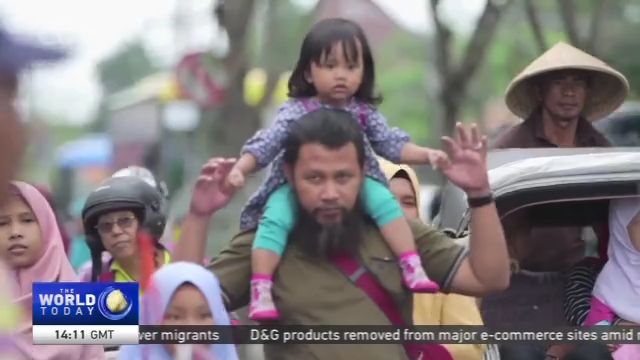
22:24, 23-Nov-2018
Indonesia Anti-Vaccine: Muslim-majority nation views vaccinations as non-halal
Updated
21:57, 26-Nov-2018
03:07

In Muslim-majority Indonesia, the health ministry is having a difficult time convincing parents to vaccinate their children. Research shows the country is now extremely vulnerable to outbreaks of rubella and measles, because many Muslim parents are waiting for an official halal vaccine approved by one of the country's largest Islamic organizations, the MUI. CGTN's Silkina Ahluwalia has more from the capital, Jakarta.
Experts and health professionals in Indonesia are calling on the Health Ministry to address what they call an "emergency situation" in relation to the low rate of vaccinations in the country. The issue in Indonesia is not quality control but rather the use of materials derived from pigs, which Muslims consider forbidden.
SILKINA AHLUWALIA JAKARTA, INDONESIA "In 2017, Indonesia had the third highest number of measles cases in the world. The Health Ministry has now created a campaign to urge parents to protect their children against the infection simply by vaccinating them. But religious objections and superstitions are preventing many families from doing that."
The use of vaccines containing traces of pork gelatin has been controversial in other Muslim-majority nations and Jewish communities as well. In Indonesia, the vaccination has been approved by the World Health Organization and has gone through multiple standard checks, but many families in the country are looking for an official halal certificate by one of the largest Islamic organization, the Indonesian Ulema Council.
DR. ABDULAZIZ ALSAYYARI HALAL CENTER REPRESENTATIVE, SAUDI FDA "We think as health professionals, the lives of kids or people that are vulnerable for vaccinations are important for us. But also that's why we are investing now in regulations of halal to make it clear and to detect the sources and to find the alternative practices."
According to the Health Ministry, only 30 percent of children between the ages of 9 months to 14 years have been vaccinated in Indonesia. That is well below the Ministry's official target of 95 percent.
DR. JOEY GOUWS GROUP LEAD, INSPECTIONS OF WHO PREQUALIFICATION PROGRAM "There's always a possibility that the virus or bacteria in the environment so the moment you're not vaccinated, your immune system is exposed to that specific virus or bacteria and then of course you get the disease. So babies that are not vaccinated is going to get the disease and it's going to spread so it's extremely important once again to vaccinate everybody."
Previously, the Ulema Council has demanded local health agencies to stop vaccine drives because the halal certification issue was not clarified yet. The goal is for the Health Ministry to work closely together with religious figures to meet the country's vaccination target to avoid serious outbreaks from happening in the future. Silkina Ahluwalia, CGTN, Jakarta.

SITEMAP
Copyright © 2018 CGTN. Beijing ICP prepared NO.16065310-3
Copyright © 2018 CGTN. Beijing ICP prepared NO.16065310-3